-
 Bitcoin
Bitcoin $113900
-1.39% -
 Ethereum
Ethereum $3517
-4.15% -
 XRP
XRP $3.009
1.59% -
 Tether USDt
Tether USDt $0.9997
-0.04% -
 BNB
BNB $766.8
-1.41% -
 Solana
Solana $164.6
-2.38% -
 USDC
USDC $0.9998
-0.02% -
 TRON
TRON $0.3277
0.65% -
 Dogecoin
Dogecoin $0.2023
-1.67% -
 Cardano
Cardano $0.7246
0.05% -
 Hyperliquid
Hyperliquid $38.27
-4.77% -
 Sui
Sui $3.528
-0.52% -
 Stellar
Stellar $0.3890
-0.73% -
 Chainlink
Chainlink $16.16
-2.69% -
 Bitcoin Cash
Bitcoin Cash $539.9
-4.38% -
 Hedera
Hedera $0.2425
-2.00% -
 Avalanche
Avalanche $21.71
-0.97% -
 Toncoin
Toncoin $3.662
5.73% -
 Ethena USDe
Ethena USDe $1.000
-0.02% -
 UNUS SED LEO
UNUS SED LEO $8.964
0.35% -
 Litecoin
Litecoin $107.7
2.33% -
 Shiba Inu
Shiba Inu $0.00001223
-0.40% -
 Polkadot
Polkadot $3.617
-0.97% -
 Uniswap
Uniswap $9.052
-2.49% -
 Monero
Monero $295.1
-3.79% -
 Dai
Dai $0.9999
0.00% -
 Bitget Token
Bitget Token $4.315
-1.85% -
 Pepe
Pepe $0.00001060
0.11% -
 Cronos
Cronos $0.1342
-2.72% -
 Aave
Aave $256.0
-0.87%
Are Kucoin contract trading signals accurate? How to choose copy trading experts?
Kucoin contract trading signals' accuracy varies; rely on reputable sources and backtesting. Choose copy trading experts by reviewing performance metrics and trading style.
May 18, 2025 at 07:49 pm
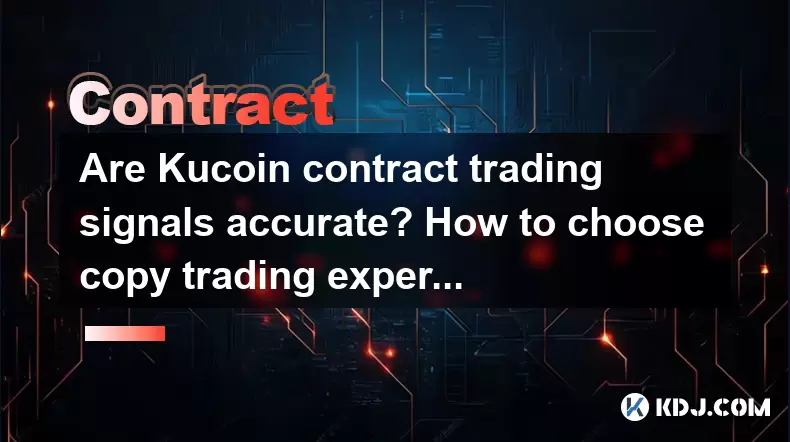
Are Kucoin contract trading signals accurate? How to choose copy trading experts?
The world of cryptocurrency trading can be both exhilarating and daunting, especially when it comes to contract trading and copy trading. For traders on the Kucoin platform, understanding the accuracy of contract trading signals and selecting the right copy trading experts are crucial steps toward achieving success. This article delves into these topics, providing detailed insights and actionable advice.
Understanding Kucoin Contract Trading Signals
Kucoin contract trading signals are tools designed to help traders make informed decisions about when to buy or sell crypto contracts. These signals are typically generated by algorithms or experienced traders and are based on various market indicators and technical analysis.
The accuracy of these signals can vary widely. Several factors influence their reliability:
- Source of the Signal: Signals from reputable sources or experienced traders tend to be more accurate than those from less established providers.
- Market Conditions: Volatile markets can make signals less reliable, as rapid price changes can quickly render predictions obsolete.
- Time Frame: Short-term signals may be less accurate than those designed for longer time frames, as they are more susceptible to market noise.
To gauge the accuracy of Kucoin contract trading signals, traders should consider the following steps:
- Track Historical Performance: Look at the past performance of the signals. Have they consistently led to profitable trades?
- Use Multiple Sources: Don’t rely on a single signal provider. Cross-referencing signals from multiple sources can provide a more balanced view.
- Backtesting: Use historical data to test how well the signals would have performed in the past. Many trading platforms offer tools for backtesting.
Factors Affecting Signal Accuracy
Several key factors can affect the accuracy of trading signals on Kucoin:
- Algorithm Complexity: More sophisticated algorithms that take into account a wider range of variables tend to produce more accurate signals.
- Real-Time Data: Signals based on real-time data are generally more reliable than those using delayed information.
- User Feedback: Community feedback and reviews can provide insights into the effectiveness of a signal provider.
How to Choose Copy Trading Experts on Kucoin
Copy trading on Kucoin allows users to automatically replicate the trades of experienced traders, known as copy trading experts. Choosing the right expert is essential for maximizing potential returns and minimizing risks.
Here are detailed steps to help you choose the best copy trading experts:
- Review Performance Metrics: Look at key performance indicators such as return on investment (ROI), win rate, and drawdown. These metrics give you a clear picture of the expert’s trading success.
- Assess Trading Style: Consider whether the expert’s trading style aligns with your risk tolerance and investment goals. Some traders focus on high-frequency trading, while others may take a more conservative approach.
- Check the Duration of Trading History: Experts with a longer track record are often more reliable. A short history may not accurately reflect their overall performance.
- Evaluate Risk Management: Good copy trading experts implement solid risk management strategies. Look for experts who use stop-loss orders and manage their position sizes effectively.
- Read Reviews and Ratings: User reviews and ratings can provide valuable insights into the expert’s reliability and customer satisfaction.
Steps to Start Copy Trading on Kucoin
To start copy trading on Kucoin, follow these detailed steps:
- Sign Up and Verify Your Account: If you haven’t already, sign up for a Kucoin account and complete the verification process.
- Navigate to the Copy Trading Section: Once logged in, go to the "Copy Trading" section on the Kucoin platform.
- Browse Available Experts: You’ll see a list of copy trading experts. Use the filters to narrow down your search based on performance metrics, trading style, and other criteria.
- Select an Expert: After reviewing the experts, choose one that meets your criteria. Click on their profile to get more detailed information.
- Allocate Funds: Decide how much money you want to allocate to copy trading. You can set a fixed amount or a percentage of your total portfolio.
- Enable Copy Trading: Click on the "Follow" button next to the expert’s name to start copying their trades. You can adjust settings such as the amount to copy and stop-loss levels.
- Monitor and Adjust: Regularly review the performance of the expert and your copy trading account. Make adjustments as needed based on your investment goals and market conditions.
Evaluating the Reliability of Copy Trading Experts
Evaluating the reliability of copy trading experts requires ongoing attention and analysis. Here are some tips to help you maintain a successful copy trading strategy:
- Regular Performance Reviews: Continuously monitor the performance of the experts you are following. If an expert’s performance declines, consider switching to another expert.
- Diversify Your Copy Trading Portfolio: Don’t put all your funds with a single expert. Diversifying across multiple experts can reduce risk and increase potential returns.
- Stay Informed: Keep up with market news and trends. Understanding the broader market context can help you make better decisions about which experts to follow.
- Adjust Your Strategy: Be flexible and willing to adjust your copy trading strategy based on changing market conditions and expert performance.
Common Pitfalls to Avoid in Copy Trading
While copy trading can be an effective way to participate in the crypto market, there are several common pitfalls that traders should avoid:
- Over-Reliance on a Single Expert: Relying too heavily on one expert can expose you to significant risk if their performance deteriorates.
- Ignoring Market Conditions: Failing to consider broader market trends can lead to poor timing of your copy trading decisions.
- Neglecting Risk Management: Not setting appropriate stop-loss levels or position sizes can result in substantial losses.
- Chasing Past Performance: Choosing experts solely based on past performance without considering other factors can be misleading, as past results do not guarantee future success.
Frequently Asked Questions
Q1: Can I use both contract trading signals and copy trading on Kucoin?
Yes, you can use both contract trading signals and copy trading on Kucoin. Many traders combine these strategies to enhance their trading decisions. Signals can provide additional insights into market trends, while copy trading allows you to leverage the expertise of successful traders.
Q2: How often should I review the performance of my copy trading experts?
It’s advisable to review the performance of your copy trading experts at least weekly. However, during periods of high market volatility, you may want to check more frequently, such as daily, to ensure that you’re still aligned with your investment goals and risk tolerance.
Q3: Are there any fees associated with using copy trading on Kucoin?
Yes, Kucoin charges a small fee for using the copy trading feature. This fee is typically a percentage of the profits generated from the copied trades. Make sure to review the fee structure on the Kucoin platform before you start copy trading.
Q4: Can I customize my copy trading settings on Kucoin?
Yes, Kucoin allows you to customize your copy trading settings. You can adjust the amount you want to copy, set stop-loss levels, and even pause or stop copying an expert’s trades at any time. This flexibility helps you tailor the copy trading experience to your specific needs and risk profile.
Disclaimer:info@kdj.com
The information provided is not trading advice. kdj.com does not assume any responsibility for any investments made based on the information provided in this article. Cryptocurrencies are highly volatile and it is highly recommended that you invest with caution after thorough research!
If you believe that the content used on this website infringes your copyright, please contact us immediately (info@kdj.com) and we will delete it promptly.
- DeFi Token Summer Gains: Is Mutuum Finance the Real Deal?
- 2025-08-02 18:30:12
- Bitcoin, Realized Price, and the Top: Are We There Yet?
- 2025-08-02 18:30:12
- Dogwifhat (WIF) Rally: Will the Meme Coin Bite Back?
- 2025-08-02 19:10:12
- PayFi Heats Up: Tron's AMA Recap & TRX's Bullish Nasdaq Debut
- 2025-08-02 19:10:12
- ARK Invest, Coinbase, and BitMine: Decoding the Crypto Investment Shuffle
- 2025-08-02 19:15:23
- JasmyCoin Under Pressure: Bears Grip Tight, Testing Lower Support
- 2025-08-02 19:15:23
Related knowledge
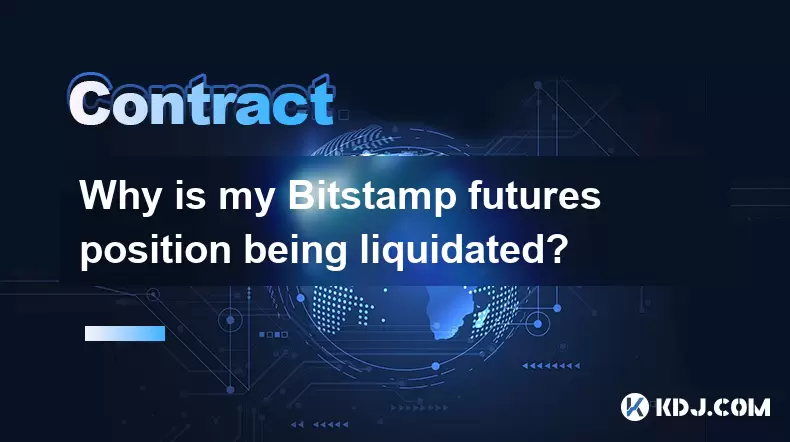
Why is my Bitstamp futures position being liquidated?
Jul 23,2025 at 11:08am
Understanding Futures Liquidation on BitstampFutures trading on Bitstamp involves borrowing funds to open leveraged positions, which amplifies both po...
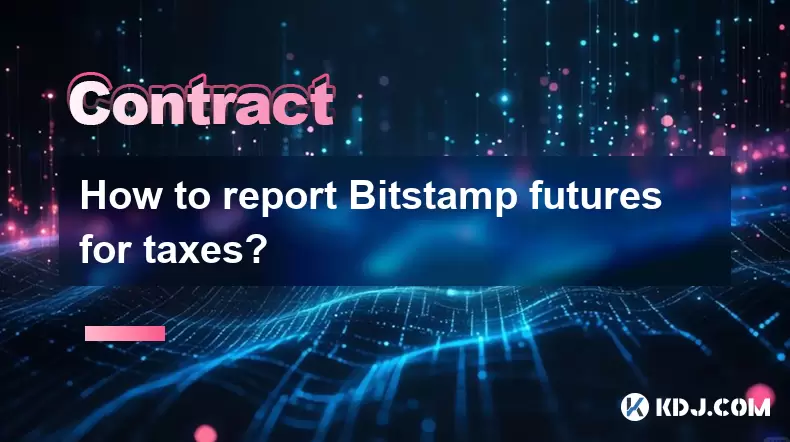
How to report Bitstamp futures for taxes?
Jul 30,2025 at 08:35am
Understanding Bitstamp Futures and Taxable EventsWhen trading Bitstamp futures, it’s essential to recognize that these financial instruments are treat...
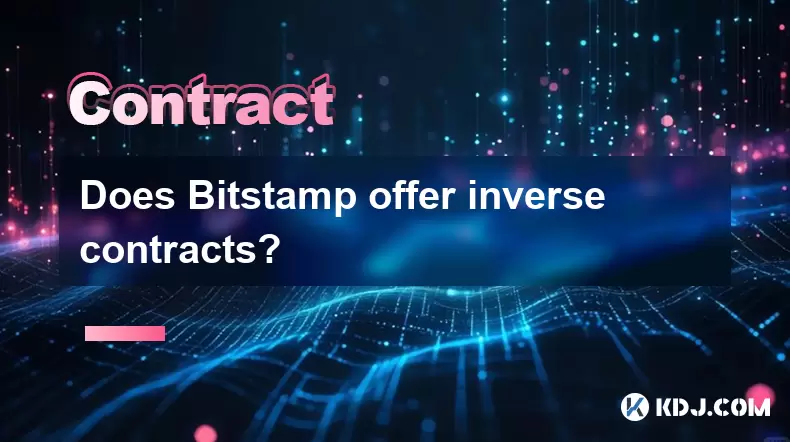
Does Bitstamp offer inverse contracts?
Jul 23,2025 at 01:28pm
Understanding Inverse Contracts in Cryptocurrency TradingIn the realm of cryptocurrency derivatives, inverse contracts are a specific type of futures ...
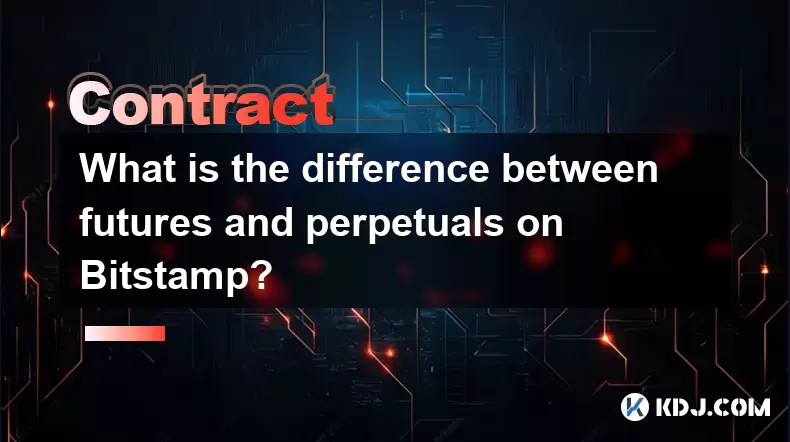
What is the difference between futures and perpetuals on Bitstamp?
Jul 27,2025 at 05:08am
Understanding Futures Contracts on BitstampFutures contracts on Bitstamp are financial derivatives that allow traders to speculate on the future price...

How to find your Bitstamp futures trade history?
Jul 23,2025 at 08:07am
Understanding Bitstamp and Futures Trading AvailabilityAs of the current state of Bitstamp’s service offerings, it is critical to clarify that Bitstam...
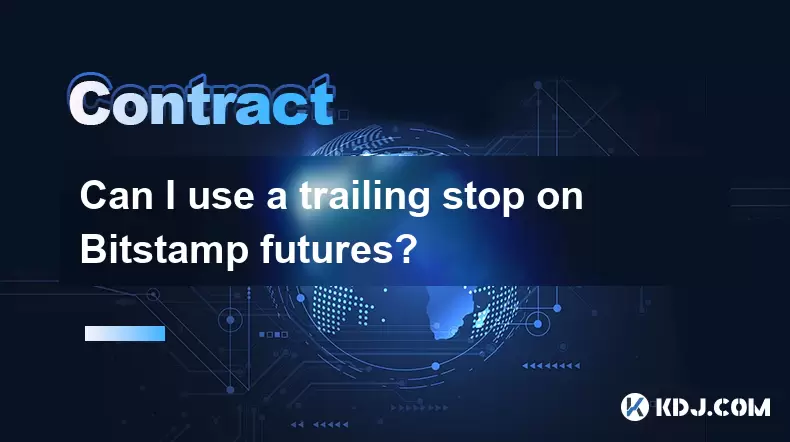
Can I use a trailing stop on Bitstamp futures?
Jul 23,2025 at 01:42pm
Understanding Trailing Stops in Cryptocurrency TradingA trailing stop is a dynamic type of stop-loss order that adjusts automatically as the price of ...

Why is my Bitstamp futures position being liquidated?
Jul 23,2025 at 11:08am
Understanding Futures Liquidation on BitstampFutures trading on Bitstamp involves borrowing funds to open leveraged positions, which amplifies both po...

How to report Bitstamp futures for taxes?
Jul 30,2025 at 08:35am
Understanding Bitstamp Futures and Taxable EventsWhen trading Bitstamp futures, it’s essential to recognize that these financial instruments are treat...

Does Bitstamp offer inverse contracts?
Jul 23,2025 at 01:28pm
Understanding Inverse Contracts in Cryptocurrency TradingIn the realm of cryptocurrency derivatives, inverse contracts are a specific type of futures ...

What is the difference between futures and perpetuals on Bitstamp?
Jul 27,2025 at 05:08am
Understanding Futures Contracts on BitstampFutures contracts on Bitstamp are financial derivatives that allow traders to speculate on the future price...

How to find your Bitstamp futures trade history?
Jul 23,2025 at 08:07am
Understanding Bitstamp and Futures Trading AvailabilityAs of the current state of Bitstamp’s service offerings, it is critical to clarify that Bitstam...

Can I use a trailing stop on Bitstamp futures?
Jul 23,2025 at 01:42pm
Understanding Trailing Stops in Cryptocurrency TradingA trailing stop is a dynamic type of stop-loss order that adjusts automatically as the price of ...
See all articles

























































































